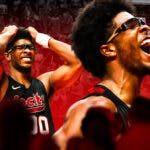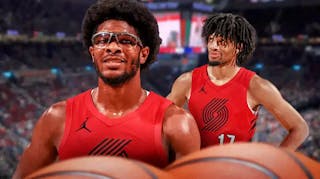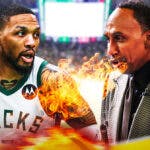Chauncey Billups wasn't most frustrated by the Cleveland Cavaliers canning 15 threes en route to 50 percent shooting from beyond the arc. Jarrett Allen's “monster” 24-point night didn't draw much ire from the rookie head coach, either. What really left Billups displeased after the Portland Trail Blazers' loss to the short-handed Cavaliers on Wednesday was his team's lagging defense at the point of attack.
“We’re not doing a good job keeping the ball in front of us. We’re getting beat too quick,” he said. “Our defense is designed to help and help your buddy, but when you get beat in one dribble that help can’t even be there yet. And now you start trying to recover and help, teams starting making shots and it puts you in a really tough spot.”
Billups didn't single any of his players out by name or point to a specific play as evidence of that toothless primary defense. He even put the onus on himself, suggesting the coaching staff placing harping harder on individual defense going forward could pay dividends for Portland.
“I gotta do a better job of demanding that from us,” Billups said.
Maybe. But anyone who's watched this team with a discerning eye over the last half-decade was surely unsurprised by Billups' justification for the Blazers' occasionally porous defense against a Cleveland team absent three key rotation players.
“Putting an address on it,” Billups' phrase for calling out players' mistakes both in the huddle and the film room, won't make Damian Lillard or C.J. McCollum any longer, quicker or stouter. The same goes for Anfernee Simons and Norman Powell, the former exploited defensively of late and the latter at an inherent physical disadvantage while playing out of position at small forward.
More diligent focus on containing the ball won't turn offense-first veterans like Lillard and McCollum into Patrick Beverley, either. Their intensity on that end has waxed and waned for years. Expecting any differently this season and beyond just because Billups is on the sidelines was always setting yourself up for disappointment. The problem now, as Billups laid out, is that breakdowns at the point of attack pull the defensive string harder than they did while Portland was deploying Terry Stotts' ultra-conservative scheme.
There's not much Jusuf Nurkic can do to prevent this alley-oop dunk from Evan Mobley when he's forced to fully commit to Darius Garland as McCollum trails behind them.
Look how much air space is between Lillard and Collin Sexton as the Cleveland guard takes a dribble hand-off from Allen, eventually scoring almost uncontested as Nurkic retreats to prevent a lob.
Possessions like that have long been all too common in Rip City.
The preseason hope was that Billups' more motion-heavy, variable offensive attack would lighten the load on Lillard and McCollum, keeping them fresh to expend more energy on the other side of the ball. Similar optimism sprang from an expectation that Portland's more aggressive defensive scheme would naturally encourage not just Lillard and McCollum, but the Blazers at large, to defend with more consistent engagement and edge.
Just days after Portland was eliminated from the playoffs by the decimated Denver Nuggets, remember, Neil Olshey placed blame for another disappointing first-round exit and the Blazers' second-to-worst ranked defense at the feet of Stotts. The personnel, he insisted, wasn't the problem.
“The first-round loss and the defensive rating at 29 was not a product of the roster,” Olshey said during his season-ending presser.
Billups certainly didn't seem to agree following another loss in which Portland's sweeping defensive issues began on the ball. So far, the Blazers' lack of size on the perimeter has been just as big an issue as it was in previous seasons under Stotts. Unlike Cleveland, which is starting three seven-footers next to its small backcourt of Garland Sexton, Portland doesn't compensate with plus length or physicality across the floor.
In fairness to Olshey, Lillard, McCollum and Simons weren't the only ones taken advantage of at the point of attack against the Cavs. There's just no excuse for Nassir Little getting so badly wrong-footed by Ricky Rubio.
Robert Covington, all arms and instincts defensively, should be able to manage a close-out on Cedi Osman that doesn't coax defensive rotations elsewhere. He's been over-helping all season, too, just like he does in Portland's zone below.
Talent always trumps system in the NBA. You won't find any coach across the league who disagrees.
Olshey's contention has long been that not only is the Blazers' core good enough to win at the highest level, but even if it wasn't, a small-market organization like Portland has inherently limited means of bringing in the types of players the entire league wants. As a result, the Blazers need to make do with who and what they have, doing everything possible to ensure their whole is greater than the sum of their parts.
That hasn't proven the case two weeks into 2021-22. Portland is still suffering the same defensive breakdowns that have always plagued this team, and even infrequent instances of all-out effort from its main culprits haven't caused them to vanish entirely.
The Blazers' biggest weakness is still their biggest weakness. And unfortunately for Billups, the strategic tweak that would allow him to strengthen it may not exist.




